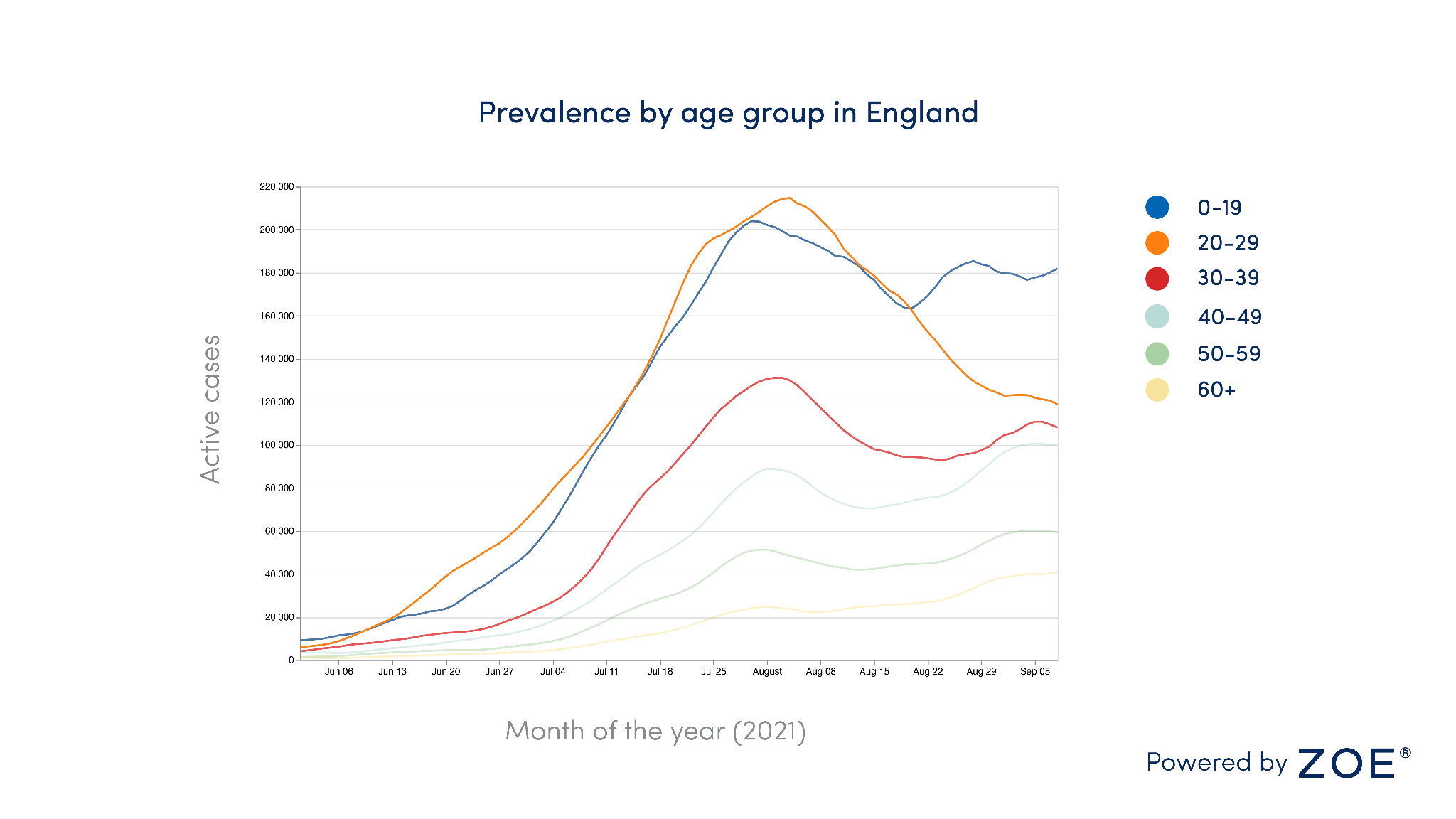
COVID cases no longer climbing as feared
September 9, 2021

This article has not been updated recently
According to ZOE COVID Study incidence figures, in total there are currently 51,876 new daily symptomatic cases of COVID in the UK on average, based on PCR and LFT test data from up to five days ago [*]. This is down 9.2% from 57,158 new daily cases last week.
In the fully vaccinated population, it’s estimated there are currently 17,674 new daily symptomatic cases in the UK. Cases in this group had been rising steadily but have now stabilised, with last week's figure being 17,342 (Graph 1).
New cases are the highest among the 0-18 and 18-35 year olds, which both have similar levels (Graph 2).
In terms of prevalence, on average 1 in 90 people in the UK currently have symptomatic COVID (Table 1).
The UK R value is estimated to be around 1.0 and regional R values are; England, 1.0, Wales, 1.1, Scotland, 1.1 (Table 1) confirming that cases have stopped rising in the UK.
Cases in Scotland continue to rise and the ZOE data highlights how cases remain highest in school age children (0-19 years old) (Graph 4). This is also true for England, with prevalence highest in the 0-19 year olds (Graph 5).
According to the latest analysis from ZOE, it’s estimated that, at current rates, 894 people a day will go on to experience symptoms for longer than 12 weeks, this is the predicted Long COVID incidence rate (Graph 6).
Graph 7 plots the ZOE prevalence figures alongside confirmed cases, which shows that the uptick in cases is also being seen in the government confirmed cases.
The ZOE data is always a week ahead of the other surveillance surveys and the data from these studies is following the recent rises and falls in the data (Graph 8).
The ZOE COVID Study incidence figures (new symptomatic cases) are based on reports from around one million weekly contributors and the proportion of newly symptomatic users who have received positive swab tests. The latest survey figures were based on data from 31,075 recent swab tests done between 21th August and 4th September 2021.
Professor Tim Spector, lead scientist on the ZOE COVID Study app, comments on the latest data:
“It’s great to see the return to schools and summer festivals haven’t yet resulted in a spike in cases as feared. However, the picture is worse in Scotland, where rates are still rising and our figures indicate that Scottish hospitals could soon be overwhelmed. The Scottish situation makes it clear we can’t be complacent about COVID as winter approaches. We are still producing far too many Long Covid cases and hospitalisations unnecessarily. For 521 days, ZOE and King’s College London have demanded cold and flu-like symptoms be recognised as common COVID-19 symptoms and communicated widely as in other countries. With UK rates the highest in Europe, if the government continues with no restrictions, surely we should at least help people to recognise the symptoms early and know when to stay at home.”
Graph 1. The ZOE COVID Study UK incidence figures results over time; total number of new cases and new cases in fully vaccinated

Graph 2. Incidence figures by age groups

Graph 3. Prevalence by region

Graph 4. Prevalence by age group in Scotland

Graph 5. Prevalence by age group in England

Graph 6. Predicted Long COVID incidence over time
Please refer to the publication by Thompson at al. (2021) for details on how long covid rates in the population are modelled

Graph 7. A comparison of prevalence figures; ZOE COVID Study, and confirmed cases

Graph 8. A comparison of prevalence figures; ZOE COVID Study, and other COVID surveillance studies

Table 1. Incidence (daily new symptomatic cases)[*], R values and prevalence regional breakdown table

Map of UK prevalence figures












.png)


.jpg)














.png)







%202.png)
.png)


















.png)




%20(1).png)


